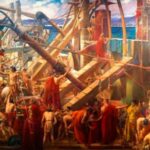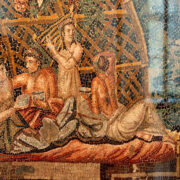The Romans held a profound admiration for Greek culture, often expressed through acts of emulation and reverence. One such manifestation of this admiration was the tradition of visiting the tombs of renowned Greek figures, a custom inherited from the Greeks themselves. Among the Romans who undertook such journeys was the distinguished orator Cicero, who claimed to have rediscovered the forgotten tomb of the legendary mathematician and inventor, Archimedes.
Archimedes: A Genius of Antiquity
Archimedes, hailed as one of the greatest scientific minds of ancient Greece, made significant contributions to mathematics, physics, engineering, and astronomy. His discovery of the principle of buoyancy, famously accompanied by the exclamation ‘Eureka!’, remains a symbol of scientific insight and discovery.
The Enigmatic Life of Archimedes
Despite his profound impact on scientific knowledge, little is known about Archimedes’ personal life. Born around 287 BC in Syracuse, Sicily, he lived during a time of conflict between Rome and Carthage. Archimedes met his demise around 212 BC, during the Roman siege of Syracuse, under circumstances that remain subject to debate and legend.
Cicero’s Journey to Rediscovery
Cicero’s account of his journey to find Archimedes’ tomb is documented in his work “Tusculan Disputations.” While serving as a quaestor in Sicily, Cicero embarked on a quest to locate the tomb, guided by cryptic verses referencing a stone cylinder and sphere. Despite skepticism from the locals, Cicero persisted and successfully identified the tomb near the Agrigentine Gate.
A Philosophical Reflection
Cicero’s tale of rediscovering Archimedes’ tomb serves as more than a historical anecdote. It is a philosophical reflection on the pursuit of knowledge over material wealth. In his discourse, Cicero juxtaposes the lives of eminent thinkers like Archimedes with those of tyrants, emphasizing the inherent superiority of intellectual pursuits.
Legacy and Symbolism
The rediscovery of Archimedes’ tomb by Cicero underscores the enduring legacy of the ancient thinker and the reverence accorded to him by subsequent generations. Beyond its historical significance, Cicero’s narrative serves as a testament to the timeless value of intellectual curiosity and the pursuit of wisdom.
Cicero’s journey to uncover the tomb of Archimedes stands as a poignant reminder of the transcendent power of knowledge and the enduring quest to unravel the mysteries of the past.
















Comments